St. John Chrysostom: On the Samaritan Woman
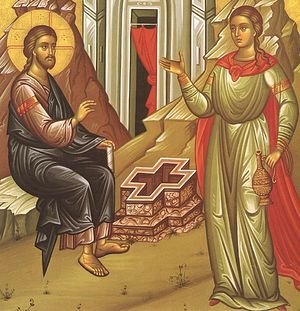 Homily 33
Homily 33
Jesus saith unto her, Woman, believe Me, the hour cometh, when ye shall neither in this mountain, nor yet at Jerusalem, worship the Father. Ye worship ye know not what; we know what we worship, for salvation is of the Jews. (Jn. 4:23-27)
[1.] Everywhere, beloved, we have need of faith, faith the mother of blessings, the medicine of salvation; and without this it is impossible to possess any one of the great doctrines. Without this, men are like to those who attempt to cross the open sea without a ship, who for a little way hold out by swimming, using both hands and feet, but when they have advanced farther, are quickly swamped by the waves: in like manner they who use their own reasonings, before they have learnt anything, suffer shipwreck; as also Paul saith, "Who concerning faith have made shipwreck." ( 1 Tim. 1:19.) That this be not our case, let us hold fast the sacred anchor by which Christ bringeth over the Samaritan woman now. For when she had said, "How say ye that Jerusalem is the place in which men ought to worship?" Christ replied, "Believe Me, woman, that the hour cometh, when ye shall neither in Jerusalem, nor yet in this mountain, worship the Father." An exceedingly great doctrine He revealed to her, and one which He did not mention either to Nicodemus or Nathanael. She was eager to prove her own privileges more honorable than those of the Jews; and this she subtly argued from the Fathers, but Christ met not this question. For it was for the time distracting to speak on the matter, and to show why the Fathers worshiped in the mountain, and why the Jews at Jerusalem. Wherefore on this point He was silent, and having taken away from both places priority in dignity, rouses her soul by showing that neither Jews nor Samaritans possessed anything great in comparison with that which was to be given; and then He introduceth the difference. Yet even thus He declared that the Jews were more honorable, not preferring place to place, but giving them the precedence because of their intention. As though He had said, "About the `place' of worship ye have no need henceforth to dispute, but in the `manner' the Jews have an advantage over you Samaritans, for `ye,' He saith, `worship ye know not what; we know what we worship.'"
Saint John the Theologian, Apostle and Evangelist
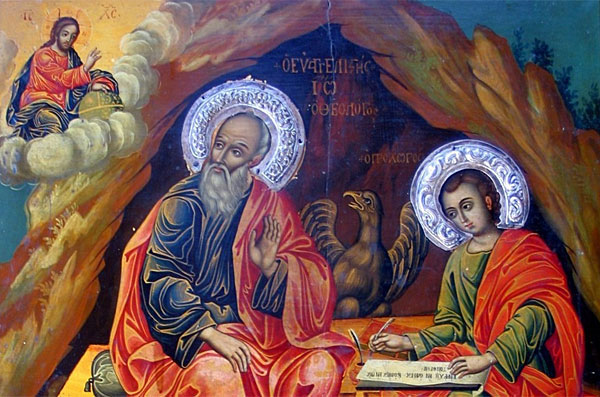 May 21st (May 8th old calendar).
May 21st (May 8th old calendar).
The Apostle and Evangelist St. John, called the Theologian, was the son of Salome and Zebedee, a fisherman of Galilee. Zebedee possessed rather vast holdings, workers and was a member of some importance in the Jewish community, having access to the high priest. John's mother Salome is mentioned in the ranks of women who served God with their possessions.
St. Athanasius the Great the Patriarch of Alexandria
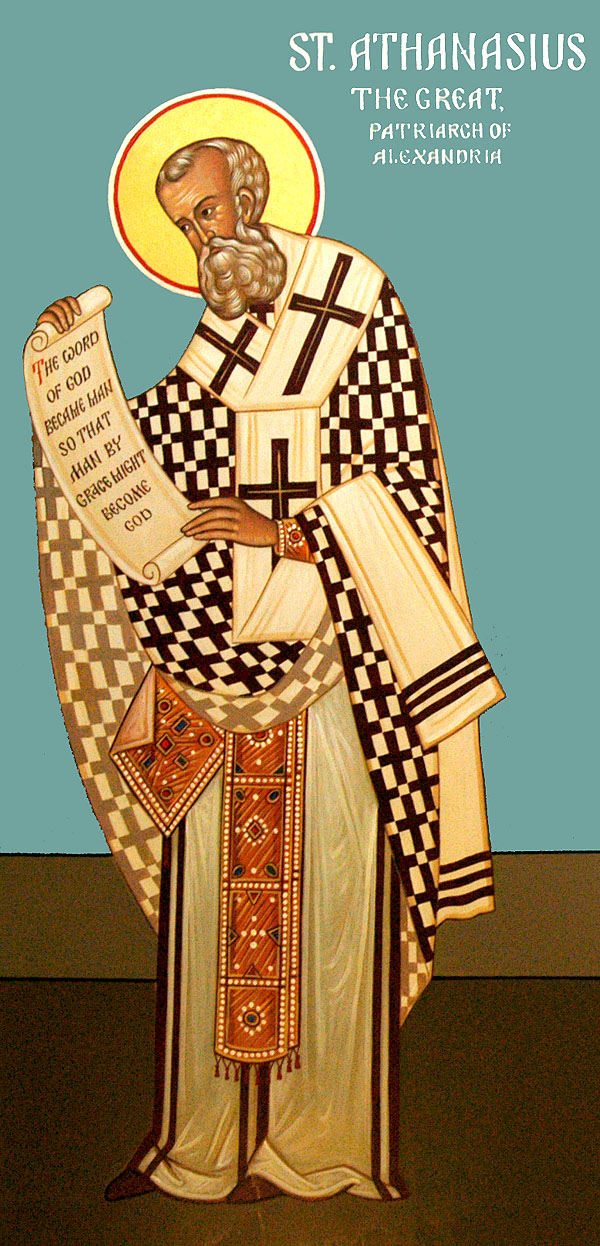 Saint Athanasius the Great, Archbishop of Alexandria, was a great Father of the Church and a pillar of Orthodoxy. He was born around the year 297 in the city of Alexandria into a family of pious Christians. He received a fine secular education, but he acquired more knowledge by diligent study of the Holy Scripture. In his childhood, the future hierarch Athanasius became known to Saint Alexander the Patriarch of Alexandria (May 29). A group of children, which included Athanasius, were playing at the seashore. The Christian children decided to baptize their pagan playmates.
Saint Athanasius the Great, Archbishop of Alexandria, was a great Father of the Church and a pillar of Orthodoxy. He was born around the year 297 in the city of Alexandria into a family of pious Christians. He received a fine secular education, but he acquired more knowledge by diligent study of the Holy Scripture. In his childhood, the future hierarch Athanasius became known to Saint Alexander the Patriarch of Alexandria (May 29). A group of children, which included Athanasius, were playing at the seashore. The Christian children decided to baptize their pagan playmates.
The young Athanasius, whom the children designated as “bishop”, performed the Baptism, precisely repeating the words he heard in church during this sacrament. Patriarch Alexander observed all this from a window. He then commanded that the children and their parents be brought to him. He conversed with them for a long while, and determined that the Baptism performed by the children was done according to the Church order. He acknowledged the Baptism as real and sealed it with the sacrament of Chrismation. From this moment, the Patriarch looked after the spiritual upbringing of Athanasius and in time brought him into the clergy, at first as a reader, and then he ordained him as a deacon.
Prophet Jeremiah
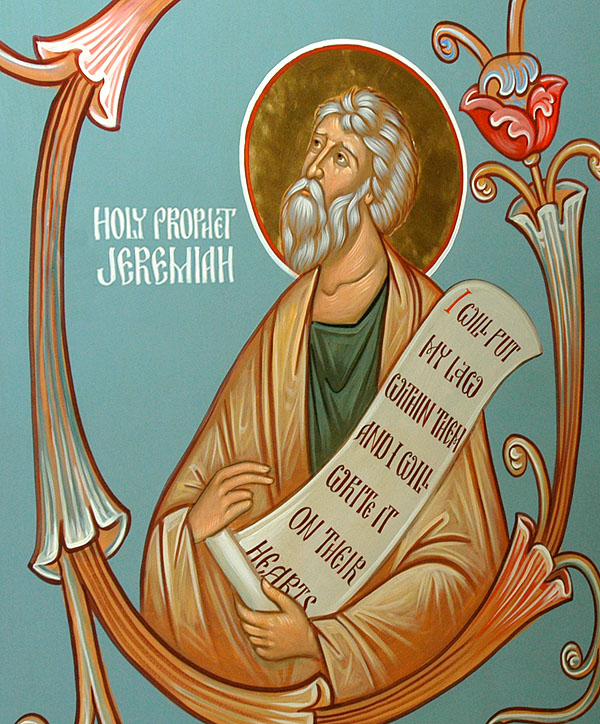 The Holy Prophet Jeremiah, one of the four great Old Testament prophets, was son of the priest Helkiah from the city of Anathoth near Jerusalem, and he lived 600 years before the Birth of Christ, under the Israelite king Josiah and four of his successors. He was called to prophetic service at the age of fifteen, when the Lord revealed to him that even before his birth the Lord had chosen him to be a prophet. Jeremiah refused, citing his youth and lack of skill at speaking, but the Lord promised to be always with him and to watch over him.
The Holy Prophet Jeremiah, one of the four great Old Testament prophets, was son of the priest Helkiah from the city of Anathoth near Jerusalem, and he lived 600 years before the Birth of Christ, under the Israelite king Josiah and four of his successors. He was called to prophetic service at the age of fifteen, when the Lord revealed to him that even before his birth the Lord had chosen him to be a prophet. Jeremiah refused, citing his youth and lack of skill at speaking, but the Lord promised to be always with him and to watch over him.
He touched the mouth of the chosen one and said, “Behold, I have put My words into your mouth. Behold, I have appointed you this day over nations and kingdoms, to root out and to pull down, to destroy and to rebuild, and to plant” (Jer. 1:9-10). From that time Jeremiah prophesied for twenty-three years, denouncing the Jews for abandoning the true God and worshipping idols, predicting sorrows and devastating wars. He stood by the gates of the city, and at the entrance to the Temple, everywhere where the people gathered, and he exhorted them with imprecations and often with tears. The people, however, mocked and abused him, and they even tried to kill him.
The Descent into Hades is a true Icon of the Resurrection
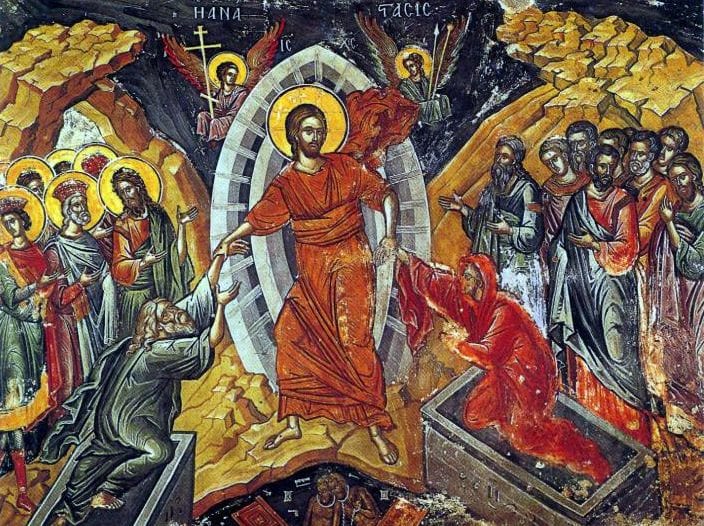 One authoritative contemporary theologian, Metropolitan Hierotheos (Vlachos) of Nafpaktos states that:
One authoritative contemporary theologian, Metropolitan Hierotheos (Vlachos) of Nafpaktos states that:
“The Church decided to regard the Descent into Hades as a true Icon of the Resurrection.... The quintessential Icon of the Resurrection of Christ is considered to be His Descent into Hades... To be sure, there are also Icons of the Resurrection which depict Christ’s appearance to the Myrrh-bearing women and the Disciples, but the Icon of the Resurrection par excellence is the shattering of death, which took place at the Descent of Christ into Hades, when His soul, together with His Divinity, went down into Hades and freed the souls of the Righteous ones of the Old Testament, who were awaiting Him as their Redeemer.”






